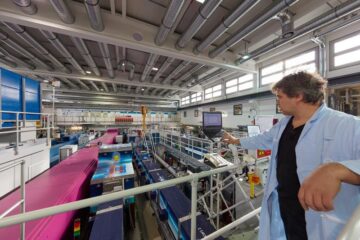Reconfigurable Magnetic Logic – MGATE magneto-resistive universal logic gate

Today’s transistor based logic gates commonly realize only one fixed logical function. Integrated digital circuitry in electronic industry therefore utilizes huge amounts of different logic gates. The complexity of large integrated circuitry can be strongly reduced by logic gates with reconfigurable logical functions. A promising approach to provide reconfigurable logic gates is to utilize cells based on magneto resistive effects like GMR or magnetic tunnel junctions (MTJ). To reach this goal the here presented technology called MGATE was developed. With only two MTJs the researchers realized a novel reconfigurable logic gate which is capable of providing each of all basic logical functions (AND, NOT, NAND, OR, NOR, XOR, and XNOR) on demand in one unit.
Commercial Opportunities: Due to the compatibility with established MRAM technologies MGATE enables the combination of logic and storage units in a whole magnetic non-volatile setup. Power saving can simply be achieved by switching off temporarily inactive units as the last information is instantaneously available on restart. MGATE opens a new approach to overcome restrictions that come along with the common Von-Neumann architecture due to complex and lossy interconnections. Even certain manufacturing errors could be corrected by simple “reprogramming” of the magnetic logic gates. Common FPGAs today are not fast enough for such concepts. The novel MGATE technology overcomes these disadvantages as the speed of programming the logic function is the same as the speed of operation.
Weitere Informationen: PDF
PROvendis GmbH
Tel.: +49 (0)208/94105 10
Ansprechpartner
Dipl.-Ing. Alfred Schillert
Media Contact
Alle Nachrichten aus der Kategorie: Technologieangebote
Neueste Beiträge

Bakterien für klimaneutrale Chemikalien der Zukunft
Forschende an der ETH Zürich haben Bakterien im Labor so herangezüchtet, dass sie Methanol effizient verwerten können. Jetzt lässt sich der Stoffwechsel dieser Bakterien anzapfen, um wertvolle Produkte herzustellen, die…

Batterien: Heute die Materialien von morgen modellieren
Welche Faktoren bestimmen, wie schnell sich eine Batterie laden lässt? Dieser und weiteren Fragen gehen Forschende am Karlsruher Institut für Technologie (KIT) mit computergestützten Simulationen nach. Mikrostrukturmodelle tragen dazu bei,…

Porosität von Sedimentgestein mit Neutronen untersucht
Forschung am FRM II zu geologischen Lagerstätten. Dauerhafte unterirdische Lagerung von CO2 Poren so klein wie Bakterien Porenmessung mit Neutronen auf den Nanometer genau Ob Sedimentgesteine fossile Kohlenwasserstoffe speichern können…

















